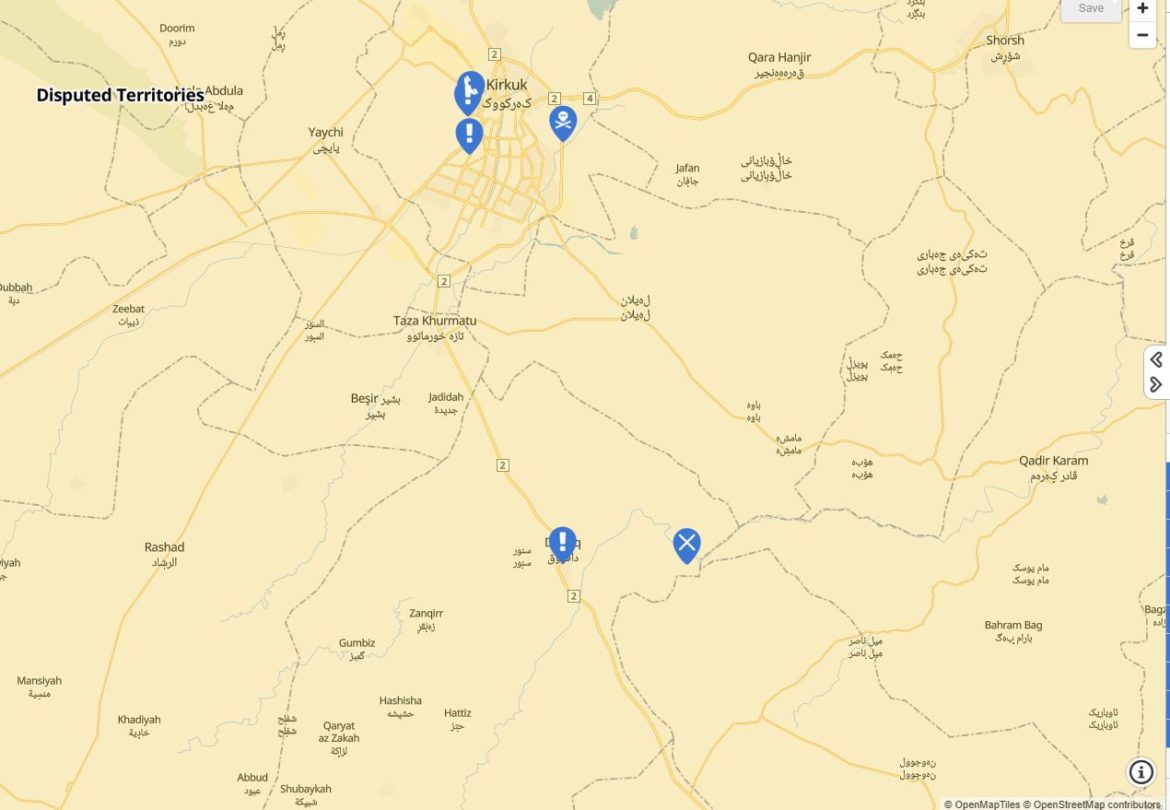1.5K
A weekly brief of events and news occurred in the disputed territories.
Kirkuk
- On February 20, many families of fallen Peshmergsa rallied against Baghdad’s suspension of their salaries. Two years ago, more than 700 families of Peshmerga martyrs had their salaries transferred to Baghdad by the former Iraqi regime, where they were canceled. However, the Iraqi government refused to spend their payments. Baghdad’s excuse is that the Federal Court decided they were paid their salaries in the Kurdistan Region for the first time. In August 2021, the Federal Court ruled that those who received their salaries in the Kurdistan Region for the first time have no right to transfer their salaries to Baghdad. These martyrs were paid in the Kurdistan Region in the 1990s when the Ba’ath Party was in power in Baghdad.
- On February 20, Gharib Askar, a Turkman lawmaker from Kirkuk and deputy speaker of parliament, presented a letter to the three Iraqi presidencies (president, prime minister, and speaker), laying out “the Turkmen political demands.” The letter included a long list of demands, mainly asking for government positions and posts such as Kirkuk governor, vice president, and ministry. The Shiite lawmaker, who Iran backs, also met with the Iraqi prime minister Mohammed Shia’ al Sudani on the same issue. The Turkmen bloc in the parliament suffered division recently as Iran and Turkey support a part of it.
- A month after the appointment of the Daquq district mayor, the issue remains disputed among Kurds, Arabs, and Turkmen. After several protests last week, the appointed Arab mayor won the support of some Turkmen tribes, while the Kurds left with some other help from the remaining Turkmen and continued to reject the mayor. The tribes’ support of the appointed mayor started as some Turkemn said their rejection would aid the Kurdish demands.
- On February 19, a Kaka’i Kurdish director of Saed Abbas village submitted a letter to Iraq’s top offices, including the ministry of defense, demanding an end to the curfews imposed for more than four years. In his letter, Sayed Saad Kaka’i said: “More than 60 villages in the [Daquq] district, half of which are inhabited by Kaka’i, cannot travel from sunset to sunrise, even to transport the sick and bury the dead.” The curfews were imposed under the pretext of Da’esh threats, but the measure encouraged Kurdish Kaka’i to leave their areas. The Kaka’i Kurds in Daquq fought Da’esh terrorists for years and suffered several attacks.
- ISIS (Da’esh) terrorists launched more attacks after the recent weeks of relative calm. On February 19, Iranian-backed Turkmen militias were attacked by Da’esh near al Bashir south of Kirkuk. Though no casualties were reported, clashes did erupt. Moreover, on February 19, Da’esh terrorists released Aram Hadi, whom they had kidnapped six months ago in the plains of Jabal Bor east of Kirkuk. It was not clear whether Hadi was released for ransom or not. The security agencies had received information that Hadi was still alive, pressuring them to increase their security operations in the area.
- On February 22, the Kirkuk police command announced that they arrested a man trying to smuggle $116,337 abroad. For two months, strict measures have been taken at the checkpoints of Kirkuk to the Kurdistan Region.
Khanaqin
- On February 22, bus and truck drivers demonstrated in front of the mayor’s office and later went on strike due to the lack of fuel distribution. According to the protesters, the lack of diesel has been a problem for three months and has still not been resolved. The protesters said they must wait two to three days at gas stations to get diesel for their vehicles. The district has been lacking primary services since 2017, including fuel.
Tuz Khurmatu
- Marri Rashid Bayati, director of Tuz Khurmatu municipality, told Kirkuk Now that more than 8,000 homes were illegally built on public land in the district. Bayati said the new federal laws would grant 80% of the residents legal ownership over their homes. On November 28, 2022, the federal government decided to give ownership to all excess houses in Iraq with some conditions.
Shingal (Sinjar)
- On February 20, a delegation of the Council of Ministers visited the district and announced the compensation process for displaced Yazidis. The delegation was led by Ivan Faiq Jabro, Minister of Immigration and Advisor to the Prime Minister on Human Rights. In a press conference, Jabro announced the release of grants to those who have returned after being displaced. Thousands of Yazidis remain displaced in the Kurdistan Region and Syria from 2014, when Da’esh committed genocide against the ethno-religious minority.

